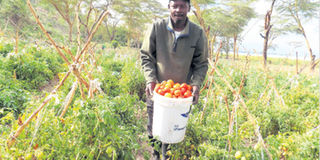Forget quails, money does grow on tomatoes

Stephen Ndung’u harvests tomatoes from his farm in Kimere Beach, Naivasha. PHOTO | RACHEL NDUNG'U | NATION MEDIA GROUP
What you need to know:
- Ndung’u grows tomatoes on a leased 4.5 acres farm at Kimere Beach where he was found last Sunday sorting and grading tomatoes under a tree.
- He describes 2012 as his worst year as his crop was wiped out by the bacterial wilt causing him heavy losses.
The southern side of Lake Naivasha is dotted with high-class hotels that host dozens of tourists every week.
Tourism supports the livelihood of tens of people that include farmers like Stephen Ndung’u.
Ndung’u grows tomatoes on a leased 4.5 acres farm at Kimere Beach where he was found last Sunday sorting and grading tomatoes under a tree.
With him were four buyers. “I serve mainly small-scale buyers on Sundays while during the week, I supply hotels and supermarkets in Naivasha,” he says as we settle down for an interview.
By December last year, the father of four had sold about 700kg of tomatoes making more than Sh28,000.
By the time the season ends this April, he expects to have quadrupled the harvest, which he is selling at an average of Sh40 a kilo or more as prices go up due to the ongoing rains.
His dalliance with farming dates back to 1989 when he completed high school in Rumuruti.
“I love eating tomatoes. I cannot stand food without tomatoes and I believe most people are like me. This is reason why the market for the produce is insatiable,” says Ndung’u.
He started growing the crop in Rumuruti, where he grew up.
ELEPHANTS
Farming there, however, was difficult and his tomato crops was destroyed by elephants.
“I gave up in 2010 after losing three acres of tomatoes to elephants. My water pumping machine was also stolen by gangsters,” he recalls.
Having lost his livelihood, Ndung’u moved to Nairobi where he found a job as a lorry driver earning Sh10,000 a month.
He saved part of the money hoping that one day he would go back to farming.
The opportunity came in 2012 when a friend told him of a farm he could lease in Naivasha.
“I invested Sh30,000 in buying a small water pump and leased the 4.5 acres at Kimere Beach at Sh45,000 a year and spent about Sh40,000 to till it and plant.” Ndung’u pays himself a salary of Sh30,000 a month.
He says tomato farming is rewarding, despite attacks by pests and diseases.
He describes 2012 as his worst year as his crop was wiped out by the bacterial wilt causing him heavy losses.
STOP FARMING
“I had to stop farming for some time until mid-2013. Even now I spray my crop about 10 times to keep diseases like leaf rust and pests like white flies and red spider mites at bay.”
He uses furrow irrigation to grow the crop, with the water coming from the nearby Lake Naivasha.
“But I farm with the environment in mind. I ensure that the water containing chemicals does not flow back into the lake,” says Ndung’u, whose farm is 50m from the water body.
He now plans to buy land near Naivasha so that he can stop leasing.
According to Prof Richard Mulwa, a horticultural scientist at Egerton University, good tomato farmers grow crops with the season in mind.
“If you grow your tomatoes when the market is saturated, you will definitely make losses. The March to May season is one of the best.”
He describes tomato as a ‘quick crop’ that can earn a farmer huge income as long as he has good quality water for irrigation.
He advises farmers to use preventive sprays that can keep fungal and bacterial pests at bay instead of waiting for the crops to be attacked then they act.”





